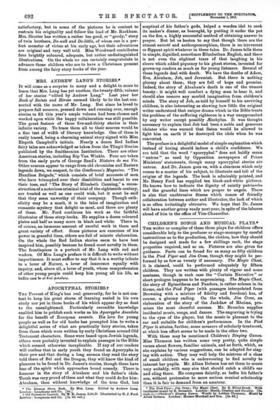APOCRYPHAL STORIES.t THE Provost of King's has real generosity, for
he is not con- tent to keep his great stores of learning sealed in his own study nor yet in those books of his which appear dry as dust to the unenlightened. Particularly recondite knowledge enabled him to publish such works as his Apocrypha Anecdota for the benefit of European savants. His love for young people as well as for old books has prompted him to write a delightful series of what are practically fairy stories, taken from those which were written by early Christians around Old Testament characters. Some were based upon Jewish legends, others were probably invented to explain passages in the Bible which seemed otherwise inexplicable. If any of our readers will confess that in early youth they found an Apocrypha in their pew and that during a long sermon they read the story told there of Bel and the Dragon, they will know the kind of pleasure to be found in Dr. James's stories, though these have less of the spirit which approaches broad comedy. There is humour in the story of Abraham and his father's idols. Terah was very proud of them and what they could do for him: Abraham, then without knowledge of the true God, but
• The Strange Story Book. By Mrs. Lang. Edited by Andrew Lang. London : 140141314.11.4 and Co. 13. t Old Testament Legends. By R. Tames, Litt.D. Illustrated by H. J. Ford. London : Longmans and Co. [3s. 6d. net.]
sceptical of his father's gods, helped a wooden idol to cook its maker's dinner, as besought, by putting it under the pot on the fire, a highly successful method of obtaining answer to prayer. But let us hasten to say that though there are the utmost naiveté and anthropomorphism, there is no irreverent or flippant spirit whatever in these tales. Dr. James tells them in simple, dignified, sometimes Elizabethan English, and there is not even the slightest trace of that laughing in his sleeve which added piquancy to his ghost stories, invented for grown-up readers as much as for young listeners. Several of these legends deal with death. We have the deaths of Adam, Eve, Abraham, Job, and Jeremiah. But there is nothing gloomy about them; they are full of hope and promise. Indeed, the story of Abraham's death is one of the utmost beauty : it might well comfort a dying man to hear it, and should also remove any morbid imagination from children's minds. The story of Job, as told by himself to his surviving children, is also interesting as showing how little the original writer understood that unique drama which in the Bible treats the problem of the suffering righteous in a way unapproached by any writer except possibly Aschylus. It was thought necessary to explain that Job had been a noble and generous idolater who was warned that Satan would be allowed to fight him on earth if he destroyed the idols when he was converted.
The preface is a delightful model of simple explanation which instead of boring should induce a child's confidence. We are told that the word " apocryphal " does not baldly mean " untrue " as used by Opposition newspapers of Prime Ministers' statements, though many apocryphal stories ai.e untrue. And Dr. James goes on, with a clearness which only cornea to a master of his subject, to illustrate and tell of the origins of the legends. The book is admirably printed, and Mr. Henry Ford has supplied ten black-and-white pictures. He knows how to indicate the dignity of saintly patriarchs and the graceful lines which are proper to angels. There is also that unobtrusive fitness which comes of friendly collaboration between author and illustrator, the lack of which is so often irritatingly obtrusive. We hope that Dr. James will have another group ready next year, in spite of the labours ahead of him in the office of Vice-Chancellor.






























































 Previous page
Previous page